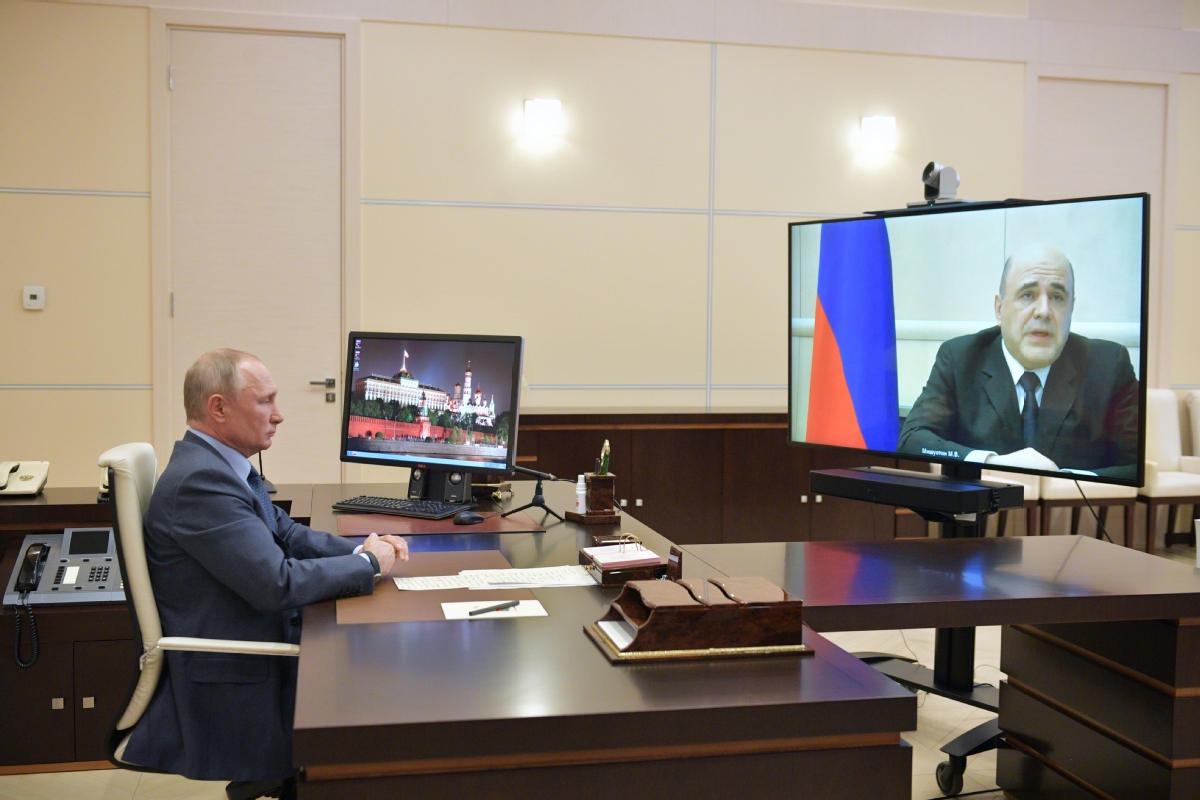Russian PM tested positive as cases jump


Russia on Friday reported a record daily rise in the number of confirmed coronavirus cases, a day after Prime Minister Mikhail Mishustin announced he had been diagnosed with the novel coronavirus.
Mishustin, 54, said during a videoconference on Thursday that his latest coronavirus tests came back positive, and he needs to "self-isolate, and follow doctors' instructions".
President Vladimir Putin, who was taking part in the videoconference with the prime minister, sighed when he heard the news and wished Mishustin a speedy recovery.
Putin also approved Mishustin's suggestion that First Deputy Prime Minister Andrei Belousov serve as acting prime minister during his absence.
Russia's nationwide total of cases rose by 7,933 cases and now stands at 114,431, with 13,220 recoveries and 1,169 deaths.
Nevertheless, World Health Organization representative to Russia Melita Vujnovic said that it might be possible for the Russian government to ease lockdown measures to curb the spread of the coronavirus in two weeks.
In Britain, Prime Minister Boris Johnson led the government's daily novel coronavirus briefing for the first time in five weeks on Thursday, when he said the nation was "past the peak of this disease" and that it was "on the downward slope".
After recovering from a COVID-19 infection, Johnson said that a plan for easing the lockdown will come next week. He added that the "entire country" is rising to a challenge "not seen in our lifetimes".
Johnson emphasized that avoiding a second spike of infections could cause "lasting economic damage" and so the government will need to "unlock the economy gradually". He added that he thinks the economy will "bounce back strongly".
The latest figures show 26,711 people in the UK have died from the coronavirus, and more than 172,000 were infected.
Elsewhere in Europe, German authorities on Thursday agreed to reopen playgrounds, churches and cultural institutions such as museums and zoos that have been shuttered because of the pandemic, but they postponed a decision on whether to relax the rules for restaurants, hotels and kindergartens.
German Chancellor Angela Merkel said while there would be regional differences because of Germany's federal structure, the overall goal remains ensuring the health system can cope with the country's outbreak.
Germany has recorded more than 162,000 confirmed cases of COVID-19 and 6,563 deaths.
Merkel said the federal and state governments wouldn't make a decision on reopening hotels and restaurants at their next meeting next Wednesday, which will focus on further relaxing the rules for schools, childcare centers and sports facilities.
Federal and state authorities also agreed on Thursday to extend a ban on large sports events, concerts and festivals until at least Aug 31.
In Ireland, Prime Minister Leo Varadkar said on Thursday his government is developing a plan to gradually ease the restrictions.
Changes will be made every two to four weeks, he said, adding the government would intervene if things are "going off track".
Across the Atlantic in the United States, the White House let its two-week-old economic reopening guidelines expire on Thursday as half of all US states forged ahead with their own strategies for easing restrictions on restaurants, retail and other businesses shuttered by the coronavirus outbreak.
The enormous pressure on states to reopen, despite a lack of wide-scale virus testing and other safeguards urged by health experts, was highlighted in new Labor Department data.
The number showed that more than 30 million people in the US have applied for jobless claims during the six-week period since mid-March, indicating the ballooning economic cost of COVID-19 shutdowns and pointing to a deepening recession.
Meanwhile, House of Representatives Speaker Nancy Pelosi said on Thursday that US state and local governments could need close to $1 trillion in aid over several years to cope with the aftermath of the coronavirus pandemic.
"We're not going to be able to cover all of it, but to the extent that we can keep the states and localities sustainable, that's our goal," Pelosi said.
By Thursday, the number of known infections in the US had climbed to well over 1 million, including more than 62,000 deaths.
Ren Qi in Moscow, Jonathan Powell in London, Liu Xuan in Beijing, Xinhua and agencies contributed to this story.

































